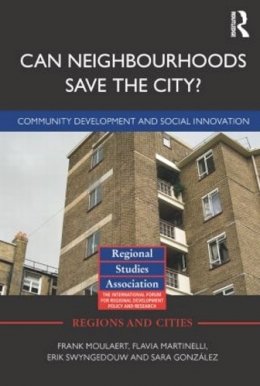
Can Neighbourhoods Save the City?: Community Development and Social Innovation
Frank Moulaert
For decades, neighbourhoods been pivotal sites of social, economic and political exclusion processes, and civil society initiatives, attempting bottom-up strategies of re-development and regeneration. In many cases these efforts resulted in the creation of socially innovative organizations, seeking to satisfy the basic human needs of deprived population groups, to increase their political capabilities and to improve social interaction both internally and between the local communities, the wider urban society and political world.
SINGOCOM - Social INnovation GOvernance and COMmunity building – is the acronym of the EU-funded project on which this book is based. Sixteen case studies of socially-innovative initiatives at the neighbourhood level were carried out in nine European cities, of which ten are analysed in depth and presented here. The book compares these efforts and their results, and shows how grass-roots initiatives, alternative local movements and self-organizing urban collectives are reshaping the urban scene in dynamic, creative, innovative and empowering ways. It argues that such grass-roots initiatives are vital for generating a socially cohesive urban condition that exists alongside the official state-organized forms of urban governance.
The book is thus a major contribution to socio-political literature, as it seeks to overcome the duality between community-development studies and strategies, and the solidarity-based making of a diverse society based upon the recognising and maintaining of citizenship rights. It will be of particular interest to both students and researchers in the fields of urban studies, social geography and political science.
Product Details
About Frank Moulaert
Reviews for Can Neighbourhoods Save the City?: Community Development and Social Innovation
